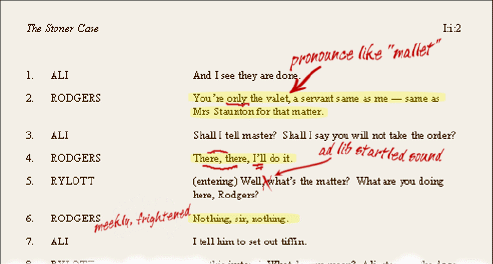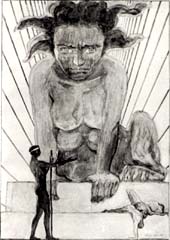What attracts me to drama is that it is, in the most obvious way, what all the arts are upon a last analysis. A farce and a tragedy are alike in this, that they are a moment of intense life. An action is taken out of all other actions; it is reduced to its simplest form, or at any rate to as simple a form as it can be brought to without our losing the sense of its place in the world. The charcters that are involved in it are freed from everything that is not a part of that action... William Butler YeatsOh, please, please, study the texts! Your scenes, your monologues -- go back and read again. I placed links-pix to great plays, if I do not have enough samples on my pages already!
What is the biggest problem with actors? They do not UNDERSTAND the text!
The young ones, of course.
And the bad too.

First Text -- drama, the words.
Monologue breakdown -- looking for action.
It's misleadingly simple.
The Beginning, the Middle and the End. (Aristotle)
Exposition, Climax, Resolution.
We know it for 25 centuries (read _The Poetics_ -- see 200X Basics).
I hope that any actor knows that there are such things as "acting theories." Craft of acting needs some systematic, organizational structure.
Acting is VERY practical business ("stage business" -- what is it?).
The secret is in application of acting theory. YOUR actual understanding of text, yourself and theory -- the performance. "Understanding" isn't enough in acting. You have to understand, to know, to feel, to move, to communicate all the above...
The major problem in acting classes is the gap between "understanding" and "doing." That's why actor needs TRAINING. The ability to perform, regardless your (personal) mood, today' situation on stage ("show must go on") and in the house ("dead public"). The show is a self-contained entity with an open structure: audience gives the new energy (fear) to actor, but an actor is acting for himself.
There are many floors in acting: we see only a tip of the iceberg -- performance.
Stanislavsky called it "Actor Prepares."
It takes a life to be a good actor. The learning never ends.
Three major states of "role" production:
I. Understanding -- "What" stage of working on your role.
II. Search, forms, discovery -- "How" stage.
III. Execution, development, perfection -- performance. And -- "why" -- why do you do it? Yes, you, personally (the most important, because if I do not understand YOU, I don't care).
What do we call "text breakdown"?
The deconstruction.
In order for you to create your "text" (performance), the original (dramatic) text has to be disassembled, understood in its own organization, evaluated (creative "reading"), re-assembled and put together by the actor as a performance (new "text").
The problem is right here -- how to do it? How to "open" the play, to figure out what is in there, and what is in there for me?
FIVE QUESTIONS TO ASK (5W's):
1. WHO? (inner conflict)
2. WHAT? (character's action, event)
3. WHEN? (time)
4. WHERE? (space)
5. WHY? (motivation)
Between "what" and "how" is "why" -- the secret.
5 Ws could be useful only if our answers are not abstract.
Age. How old is your character?
-She is twenty five?
Why not twenty six?
The exact age could be played if it's dramatic fact; her birthday (today, tomorrow), or being "25" prevents her from getting something what she could get at 26, or did she lost something becoming 25?
Understanding begins from not knowing.
-I don't understand my character.
Good. What don't you understand?
Instant "understanding" is an illusion, misunderstanding. Do you understand yourself? how about "knowing" instead of "understanding"? Do you know (recognize) your character? Could you place this character within the frame of your own experience? Does she remain you somebody? Is anything in you resemble her?
Who -- everything essential about your character.
Text breakdown is far from being a formal process. Meaning, logic, guesses are guiding you through this process of deconstruction.
When -- time of the day, season, historical era, and the day itself. Is it the Forth of July? Valentine day? Christmas? Friday? Monday? You have to help yourself to visualize the time of your character -- given circumstances.
PS: After you got some idea about the dramatic structure of your monologue, think about Physicalization and Body Breakdown.
Term introduced:
"Five Ws"
"Motivation"
"Composition 1-2-3"
(see Glossary 1-2-3!)
HOME WORK
Character Analysis (5 Ws)
Tests, questions: Select the monologue (see 3 Sisters), work on it and bring it to class.
NB * Stanislavsky: «We have as many planes of speech as does a painting planes of perspective which create perspective in a phrase. The most important word stands out most vividly defined in the very foreground of the sound plane. Less important words create a series of deeper planes».
WWWilde directory has the first act online: use the scenes for analysis.




 On the Harmful Effects of Tobacco (1886, 1902) (On the Harm of Tobacco)
On the Harmful Effects of Tobacco (1886, 1902) (On the Harm of Tobacco)